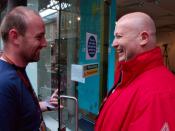Satire and Irony in Poetry
Literature has been used for decades to satire and criticize society and social mandates. Catch-22 by Joseph Heller criticizes war and morality, Mark Twain used satire to criticize imperialism in King Leopold's Soliloquy, and in Animal Farm George Orwell satires the Russian revolution. In the poem Richard Cory by Erwin Robinson satire is used to convey a message that material possessions cannot buy happiness. Similarly, in the poem The Unknown Citizen by W. H. Auden satire is used to describe a man attempting to live by society's standards yet unable to achieve happiness through it. These two poems question society's very definition of happiness and life fulfillment, they use irony to describe men whose lives fit the definition but are unable to achieve happiness through it.
The first stanza in Richard Cory is used to introduce the main character, Richard Cory, as a "gentleman from sole to crown" (Robinson 3) and "clean flavored, and imperially slim" (4).
It gives us a sense of a person who is very well liked around his town as well as clean-cut; the usage of the word "crown" gives us an image of a king who is beloved by his people. In the second stanza, it gets more personal, "And he was always human when he talked⦠he glittered when he walked" (6-8) it reads. It describes a man who is friendly and normal; it humanizes him and allows the reader to connect with Richard. The third stanza gives us more of an insight to his life saying, "and he was rich - yes, richer than a king" (9) which make the townspeople "wish that [they] were in his place" (12). Lastly, the ending stanza reveals that Richard commits suicide, meaning that he was miserable and joyless. Richard Cory...


